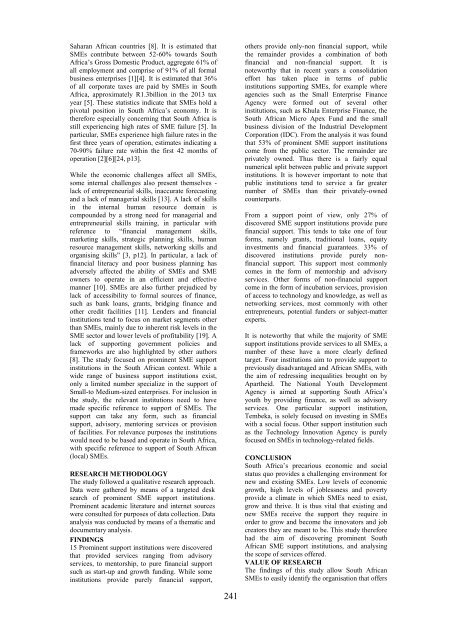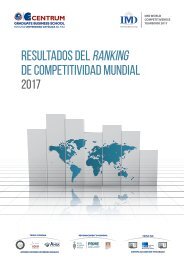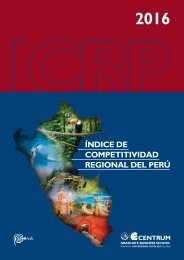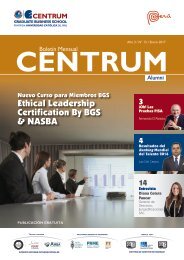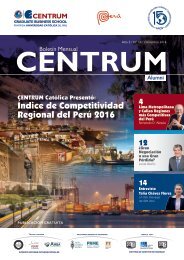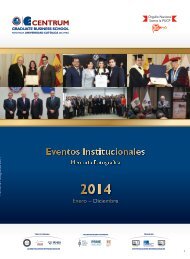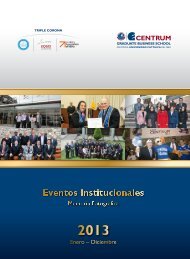Pan-Pacific Conference XXXIV. Designing New Business Models in Developing Economies
This publication represents the Proceedings of the 34th Annual Pan-Pacific Conference being held in Lima, Peru May 29-31, 2017. The Pan-Pacific Conference has served as an important forum for the exchange of ideas and information for promoting understanding and cooperation among the peoples of the world since 1984. Last year, we had a memorable conference in Miri, Malaysia, in cooperation with Curtin University Sarawak, under the theme of “Building a Smart Society through Innovation and Co-creation.” Professor Pauline Ho served as Chair of the Local Organizing Committee, with strong leadership support of Pro Vice-Chancellor Professor Jim Mienczakowski and Dean Jonathan Winterton.
This publication represents the Proceedings of the 34th Annual Pan-Pacific Conference being held in Lima, Peru May 29-31, 2017. The Pan-Pacific Conference has served as an important forum for the exchange of ideas and information for promoting understanding and cooperation among the peoples of the world since 1984. Last year, we had a memorable conference in Miri, Malaysia, in cooperation with Curtin University Sarawak, under the theme of “Building a Smart Society through Innovation and Co-creation.” Professor Pauline Ho served as Chair of the Local Organizing Committee, with strong leadership support of Pro Vice-Chancellor Professor Jim Mienczakowski and Dean Jonathan Winterton.
You also want an ePaper? Increase the reach of your titles
YUMPU automatically turns print PDFs into web optimized ePapers that Google loves.
Saharan African countries [8]. It is estimated that<br />
SMEs contribute between 52-60% towards South<br />
Africa’s Gross Domestic Product, aggregate 61% of<br />
all employment and comprise of 91% of all formal<br />
bus<strong>in</strong>ess enterprises [1][4]. It is estimated that 36%<br />
of all corporate taxes are paid by SMEs <strong>in</strong> South<br />
Africa, approximately R1.3billion <strong>in</strong> the 2013 tax<br />
year [5]. These statistics <strong>in</strong>dicate that SMEs hold a<br />
pivotal position <strong>in</strong> South Africa’s economy. It is<br />
therefore especially concern<strong>in</strong>g that South Africa is<br />
still experienc<strong>in</strong>g high rates of SME failure [5]. In<br />
particular, SMEs experience high failure rates <strong>in</strong> the<br />
first three years of operation, estimates <strong>in</strong>dicat<strong>in</strong>g a<br />
70-90% failure rate with<strong>in</strong> the first 42 months of<br />
operation [2][6][24, p13].<br />
While the economic challenges affect all SMEs,<br />
some <strong>in</strong>ternal challenges also present themselves -<br />
lack of entrepreneurial skills, <strong>in</strong>accurate forecast<strong>in</strong>g<br />
and a lack of managerial skills [13]. A lack of skills<br />
<strong>in</strong> the <strong>in</strong>ternal human resource doma<strong>in</strong> is<br />
compounded by a strong need for managerial and<br />
entrepreneurial skills tra<strong>in</strong><strong>in</strong>g, <strong>in</strong> particular with<br />
reference to “f<strong>in</strong>ancial management skills,<br />
market<strong>in</strong>g skills, strategic plann<strong>in</strong>g skills, human<br />
resource management skills, network<strong>in</strong>g skills and<br />
organis<strong>in</strong>g skills” [3, p12]. In particular, a lack of<br />
f<strong>in</strong>ancial literacy and poor bus<strong>in</strong>ess plann<strong>in</strong>g has<br />
adversely affected the ability of SMEs and SME<br />
owners to operate <strong>in</strong> an efficient and effective<br />
manner [10]. SMEs are also further prejudiced by<br />
lack of accessibility to formal sources of f<strong>in</strong>ance,<br />
such as bank loans, grants, bridg<strong>in</strong>g f<strong>in</strong>ance and<br />
other credit facilities [11]. Lenders and f<strong>in</strong>ancial<br />
<strong>in</strong>stitutions tend to focus on market segments other<br />
than SMEs, ma<strong>in</strong>ly due to <strong>in</strong>herent risk levels <strong>in</strong> the<br />
SME sector and lower levels of profitability [19]. A<br />
lack of support<strong>in</strong>g government policies and<br />
frameworks are also highlighted by other authors<br />
[8]. The study focused on prom<strong>in</strong>ent SME support<br />
<strong>in</strong>stitutions <strong>in</strong> the South African context. While a<br />
wide range of bus<strong>in</strong>ess support <strong>in</strong>stitutions exist,<br />
only a limited number specialize <strong>in</strong> the support of<br />
Small-to Medium-sized enterprises. For <strong>in</strong>clusion <strong>in</strong><br />
the study, the relevant <strong>in</strong>stitutions need to have<br />
made specific reference to support of SMEs. The<br />
support can take any form, such as f<strong>in</strong>ancial<br />
support, advisory, mentor<strong>in</strong>g services or provision<br />
of facilities. For relevance purposes the <strong>in</strong>stitutions<br />
would need to be based and operate <strong>in</strong> South Africa,<br />
with specific reference to support of South African<br />
(local) SMEs.<br />
RESEARCH METHODOLOGY<br />
The study followed a qualitative research approach.<br />
Data were gathered by means of a targeted desk<br />
search of prom<strong>in</strong>ent SME support <strong>in</strong>stitutions.<br />
Prom<strong>in</strong>ent academic literature and <strong>in</strong>ternet sources<br />
were consulted for purposes of data collection. Data<br />
analysis was conducted by means of a thematic and<br />
documentary analysis.<br />
FINDINGS<br />
15 Prom<strong>in</strong>ent support <strong>in</strong>stitutions were discovered<br />
that provided services rang<strong>in</strong>g from advisory<br />
services, to mentorship, to pure f<strong>in</strong>ancial support<br />
such as start-up and growth fund<strong>in</strong>g. While some<br />
<strong>in</strong>stitutions provide purely f<strong>in</strong>ancial support,<br />
others provide only-non f<strong>in</strong>ancial support, while<br />
the rema<strong>in</strong>der provides a comb<strong>in</strong>ation of both<br />
f<strong>in</strong>ancial and non-f<strong>in</strong>ancial support. It is<br />
noteworthy that <strong>in</strong> recent years a consolidation<br />
effort has taken place <strong>in</strong> terms of public<br />
<strong>in</strong>stitutions support<strong>in</strong>g SMEs, for example where<br />
agencies such as the Small Enterprise F<strong>in</strong>ance<br />
Agency were formed out of several other<br />
<strong>in</strong>stitutions, such as Khula Enterprise F<strong>in</strong>ance, the<br />
South African Micro Apex Fund and the small<br />
bus<strong>in</strong>ess division of the Industrial Development<br />
Corporation (IDC). From the analysis it was found<br />
that 53% of prom<strong>in</strong>ent SME support <strong>in</strong>stitutions<br />
come from the public sector. The rema<strong>in</strong>der are<br />
privately owned. Thus there is a fairly equal<br />
numerical split between public and private support<br />
<strong>in</strong>stitutions. It is however important to note that<br />
public <strong>in</strong>stitutions tend to service a far greater<br />
number of SMEs than their privately-owned<br />
counterparts.<br />
From a support po<strong>in</strong>t of view, only 27% of<br />
discovered SME support <strong>in</strong>stitutions provide pure<br />
f<strong>in</strong>ancial support. This tends to take one of four<br />
forms, namely grants, traditional loans, equity<br />
<strong>in</strong>vestments and f<strong>in</strong>ancial guarantees. 33% of<br />
discovered <strong>in</strong>stitutions provide purely nonf<strong>in</strong>ancial<br />
support. This support most commonly<br />
comes <strong>in</strong> the form of mentorship and advisory<br />
services. Other forms of non-f<strong>in</strong>ancial support<br />
come <strong>in</strong> the form of <strong>in</strong>cubation services, provision<br />
of access to technology and knowledge, as well as<br />
network<strong>in</strong>g services, most commonly with other<br />
entrepreneurs, potential funders or subject-matter<br />
experts.<br />
It is noteworthy that while the majority of SME<br />
support <strong>in</strong>stitutions provide services to all SMEs, a<br />
number of these have a more clearly def<strong>in</strong>ed<br />
target. Four <strong>in</strong>stitutions aim to provide support to<br />
previously disadvantaged and African SMEs, with<br />
the aim of redress<strong>in</strong>g <strong>in</strong>equalities brought on by<br />
Apartheid. The National Youth Development<br />
Agency is aimed at support<strong>in</strong>g South Africa’s<br />
youth by provid<strong>in</strong>g f<strong>in</strong>ance, as well as advisory<br />
services. One particular support <strong>in</strong>stitution,<br />
Tembeka, is solely focused on <strong>in</strong>vest<strong>in</strong>g <strong>in</strong> SMEs<br />
with a social focus. Other support <strong>in</strong>stitution such<br />
as the Technology Innovation Agency is purely<br />
focused on SMEs <strong>in</strong> technology-related fields.<br />
CONCLUSION<br />
South Africa’s precarious economic and social<br />
status quo provides a challeng<strong>in</strong>g environment for<br />
new and exist<strong>in</strong>g SMEs. Low levels of economic<br />
growth, high levels of joblessness and poverty<br />
provide a climate <strong>in</strong> which SMEs need to exist,<br />
grow and thrive. It is thus vital that exist<strong>in</strong>g and<br />
new SMEs receive the support they require <strong>in</strong><br />
order to grow and become the <strong>in</strong>novators and job<br />
creators they are meant to be. This study therefore<br />
had the aim of discover<strong>in</strong>g prom<strong>in</strong>ent South<br />
African SME support <strong>in</strong>stitutions, and analys<strong>in</strong>g<br />
the scope of services offered.<br />
VALUE OF RESEARCH<br />
The f<strong>in</strong>d<strong>in</strong>gs of this study allow South African<br />
SMEs to easily identify the organisation that offers<br />
241


